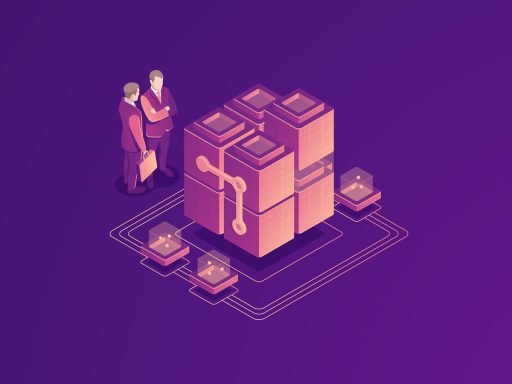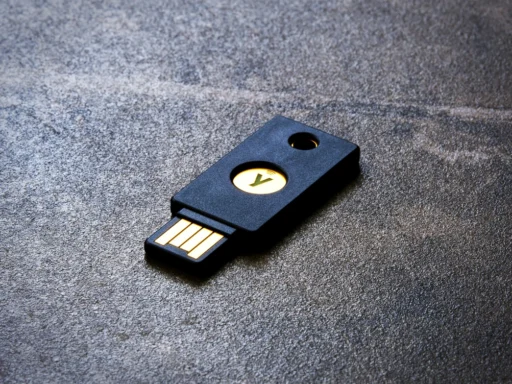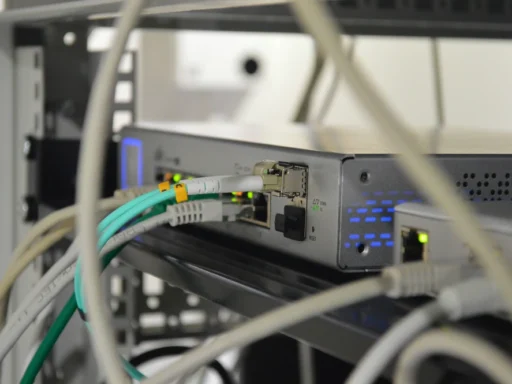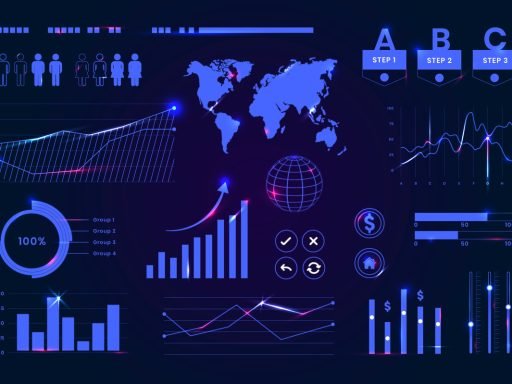Blockchain technology, originally developed as the underlying technology for cryptocurrencies like Bitcoin, has expanded far beyond its initial use case. Today, it is being leveraged across various industries—from finance to supply chain management—to create decentralized systems that promise greater security, transparency, and efficiency. Unlike traditional centralized databases, where a single entity controls the data, blockchain enables decentralized networks where data is distributed across multiple nodes, with no central authority.
This decentralization offers several advantages:
- Security: The distributed nature of blockchain makes it highly resistant to tampering and cyberattacks, as altering the data on one node would require altering it on all nodes simultaneously.
- Transparency: Every transaction on a blockchain is recorded on a public ledger, providing full transparency and traceability.
- User Control: In decentralized systems, users have greater control over their data, as they are not dependent on a central authority to manage it.
However, these benefits come with significant challenges, particularly in the realm of data governance.
Key Challenges in Decentralized Data Governance
1. Lack of Centralized Authority
One of the fundamental challenges of decentralized data governance is the absence of a centralized authority. In traditional systems, data governance is typically managed by a central body that establishes and enforces policies, standards, and procedures. In a decentralized environment, this central oversight is missing, making it difficult to ensure consistency and compliance across the network.
Without a central authority, questions arise about who is responsible for maintaining data quality, enforcing governance policies, and resolving disputes. This lack of centralized control can lead to fragmented governance practices and inconsistencies in how data is managed across different nodes in the network.
2. Legal and Regulatory Compliance
Decentralized systems pose unique challenges in terms of legal and regulatory compliance. Data protection regulations like the General Data Protection Regulation (GDPR) and the California Consumer Privacy Act (CCPA) were designed with centralized systems in mind, where a single entity is responsible for data management and compliance.
In a decentralized network, it is often unclear who holds responsibility for ensuring compliance with these regulations. For example, under GDPR, individuals have the right to request the deletion of their personal data. In a blockchain system, where data is immutable and cannot be easily altered or deleted, this presents a significant compliance challenge.
3. Data Privacy and Security
While blockchain is known for its security features, such as cryptographic hashing and decentralized consensus mechanisms, it also presents new data privacy challenges. The transparent nature of blockchain means that once data is recorded, it is visible to all participants in the network. This can be problematic when dealing with sensitive information, such as personal data or confidential business transactions.
Additionally, the security of a decentralized network depends on the collective behavior of its participants. If a majority of nodes are compromised (in what is known as a 51% attack), the integrity of the entire network can be jeopardized.
4. Interoperability and Data Standardization
Decentralized networks often operate in silos, with different blockchains using different protocols, data formats, and governance models. This lack of standardization creates challenges for interoperability—how different blockchains and decentralized applications (dApps) communicate and share data with each other.
Without standardized data governance practices, it becomes difficult to ensure that data is consistent, accurate, and reliable across different decentralized networks. This fragmentation can hinder the scalability and adoption of decentralized technologies, as organizations may struggle to integrate them into their existing data ecosystems.
5. Governance of Smart Contracts
Smart contracts—self-executing contracts with the terms of the agreement directly written into code—are a key feature of many blockchain platforms. While they offer automation and efficiency, they also introduce new governance challenges. Once deployed, smart contracts are typically immutable, meaning that errors or vulnerabilities in the code cannot be easily corrected.
This immutability raises questions about accountability and governance. Who is responsible if a smart contract fails to execute as intended, or if it is exploited by malicious actors? How can organizations ensure that smart contracts comply with legal and regulatory requirements?
Solutions for Decentralized Data Governance
While the challenges of decentralized data governance are significant, they are not insurmountable. Organizations can adopt several strategies to navigate these complexities and leverage the benefits of decentralized technologies.
1. Establish Decentralized Governance Frameworks
To address the lack of centralized authority, organizations can establish decentralized governance frameworks that involve all stakeholders in the decision-making process. These frameworks should define roles, responsibilities, and procedures for managing data across the network, ensuring that all participants adhere to agreed-upon standards.
Actionable Tip: Consider implementing a decentralized autonomous organization (DAO), where governance decisions are made collectively by network participants through voting mechanisms. DAOs can provide a structured approach to decentralized governance while maintaining transparency and accountability.
2. Adapt Compliance Strategies for Decentralized Systems
Organizations must adapt their compliance strategies to address the unique challenges of decentralized systems. This may involve developing new tools and methodologies for ensuring compliance with data protection regulations, such as GDPR and CCPA, in a decentralized context.
Actionable Tip: Explore the use of privacy-enhancing technologies (PETs) such as zero-knowledge proofs and homomorphic encryption to protect sensitive data in a decentralized network. These technologies can help balance the need for transparency with the need for data privacy.
3. Implement Privacy and Security Best Practices
To mitigate privacy and security risks, organizations should implement robust data encryption, access controls, and audit trails in their decentralized networks. Additionally, they should establish protocols for managing and responding to security incidents, including mechanisms for recovering from 51% attacks or other breaches.
Actionable Tip: Consider using off-chain solutions for storing sensitive data, with only hashes or references to the data stored on-chain. This can help maintain privacy while still leveraging the benefits of blockchain technology.
4. Promote Interoperability and Standardization
To overcome challenges related to interoperability and data standardization, organizations should collaborate with industry groups and standards bodies to develop common protocols and governance models for decentralized networks.
Actionable Tip: Participate in initiatives such as the InterWork Alliance or the Enterprise Ethereum Alliance, which are working to establish interoperability standards for blockchain and decentralized technologies.
5. Governance of Smart Contracts
To address the governance challenges associated with smart contracts, organizations should adopt best practices for smart contract development, including thorough testing, auditing, and the use of formal verification methods to ensure the correctness of the code.
Actionable Tip: Implement upgradability features in smart contracts, allowing for the deployment of new versions without compromising the integrity of the contract. This can provide a way to address vulnerabilities or adapt to changing legal requirements.
Real-World Examples of Decentralized Data Governance
Case Study: Decentralized Finance (DeFi)
Decentralized finance (DeFi) platforms, which enable financial transactions without intermediaries, have rapidly grown in popularity. These platforms rely heavily on smart contracts and decentralized governance models. One successful example is the MakerDAO, a DAO that governs the Maker Protocol—a decentralized lending platform on the Ethereum blockchain.
MakerDAO participants vote on key governance decisions, such as changes to the protocol’s interest rates or collateral requirements. This decentralized governance model has allowed the Maker Protocol to operate securely and efficiently while adapting to the rapidly changing DeFi landscape.
Case Study: Supply Chain Management
Blockchain is increasingly being used to enhance transparency and traceability in supply chains. A prominent example is the IBM Food Trust network, which uses blockchain to track the journey of food products from farm to table. The decentralized nature of the network allows all participants—farmers, processors, distributors, and retailers—to contribute data, ensuring transparency across the supply chain.
IBM Food Trust has implemented decentralized governance practices to manage data quality and security across the network, helping to build trust among participants and consumers alike.
Conclusion: Navigating the Future of Decentralized Data Governance
As blockchain and decentralized technologies continue to evolve, they will play an increasingly important role in how data is governed. While these technologies offer significant benefits, they also present unique challenges that require new approaches to data governance.
By establishing decentralized governance frameworks, adapting compliance strategies, implementing robust privacy and security measures, promoting interoperability, and governing smart contracts effectively, organizations can navigate the complexities of decentralized data governance and unlock the full potential of blockchain technology.
Call to Action: Join the Conversation
How is your organization addressing the challenges of decentralized data governance? Share your experiences and insights in the comments below. If you found this article helpful, consider sharing it with your network to help others navigate the evolving landscape of decentralized technologies.












